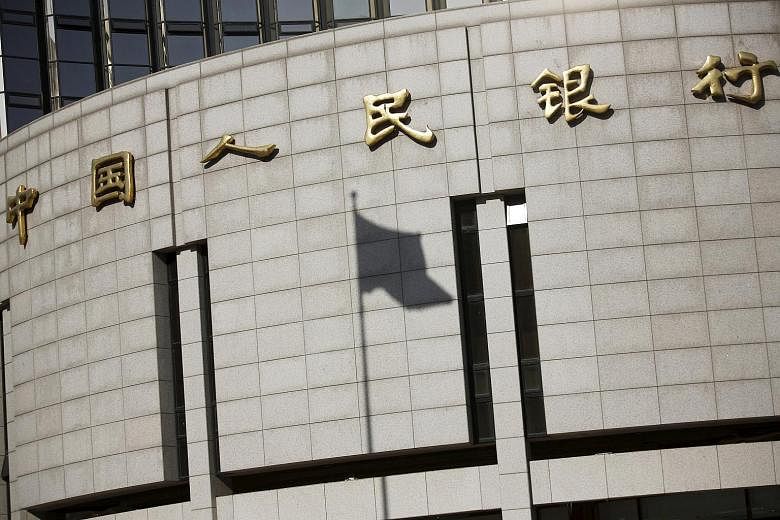HONG KONG (BLOOMBERG) - Asian currencies and stocks recovered from a two-day selloff as China's central bank eased concern about a disorderly devaluation of the yuan. Treasuries and gold weakened as demand for havens abated.
The yuan slipped 0.5 per cent to 6.4160 per US dollar as China weakened its reference rate for a third day. The Bloomberg JPMorgan Asia Dollar Index was little changed after its biggest two-day selloff since 2011. Gold slipped 0.2 per cent.
The People's Bank of China said it supports a strong, stable yuan in the long term after its Tuesday decision to devalue the currency roiled global markets. The move stalled the dUS ollar's advance and boosted the appeal of sovereign bonds amid speculation the deflationary impact may give the Federal Reserve pause as it considers the timing of its first interest-rate increase since 2006.
"It's been an overreaction," said Sean Darby, Jefferies Group Inc.'s chief global equity strategist. "This has been on the agenda for some time. The move is probably a very good adjustment for China in the longer term."
The People's Bank of China reduced the level around which the yuan can trade by 1.1 per cent to 6.401 per dollar Thursday, taking its three-day devaluation to 4.7 per cent. The fixing was slightly weaker than Wednesday's onshore closing price, the second day in a row the rate had been set in such a manner.
The PBOC said Tuesday it wants market makers who submit contributing prices to consider the previous day's close, foreign-exchange demand and supply, as well as changes in major currency rates. Policy makers had kept the yuan stable versus the dollar for about four months even as other emerging-market currencies tumbled.
The won strengthened to 1,173.63 per dollar after the Bank of Korea held rates, cooling speculation that China's policy shift would spark a round of devaluations around the region. The ringgit advanced 0.5 per cent after weakening on Wednesday beyond 4 per dollar for the first time since the Asian financial crisis.
Singapore's dollar climbed 0.3 per cent after its biggest two-day loss since 2011. The Australian and New Zealand currencies were little changed, arresting declines driven by concern a weaker yuan would reduce demand from their biggest trade partner. The euro and yen weakened.
Tencent Holdings Ltd., China's second-biggest Internet company, jumped 6.4 percent in Hong Kong, driving a gauge of technology shares to the biggest gain among the 10 groups on the emerging-market stock index. Surging ad revenue was behind a 25 percent increase in net income that beat analyst estimates.
The Hang Seng Index and a gauge of Chinese companies listed in the city rose at least 0.3 per cent. Singapore's Straits Times Index climbed 1.2 per cent and the S&P/ASX 200 Index increased 0.1 per cent in Sydney. The Jakarta Composite Index added 2 percent after a five-day, 7.7 per cent rout.
A managed floating exchange rate regime is suitable for China and the central bank has already exited regular intervention, PBOC Deputy Governor Yi Gang said at a briefing in Beijing. Authorities in China sold dollars via state-owned banks to support the yuan on Wednesday and told lenders to limit some firms' purchases of the greenback, people familiar with the matter said.

